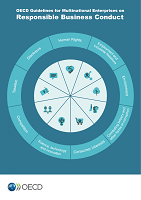
- Brief presentation of the 11 chapters that make up the Guidelines :



Chapter III. Disclosure
Enterprises are facing increasing demands for disclosure of sustainability information. They should disclose information on all material matters that can reasonably be expected to influence an investor’s assessment of the enterprise’s value. It is also important that they communicate credible information on their due diligence processes and the impacts of their operations, products and services on people, planet and society.

Chapter IV. Human rights

Chapter V. Employment and Industrial Relations

Chapter VI. Environment
Enterprises should conduct due diligence to address adverse environ- mental impacts of their operations, products and services. This includes impacts such as climate change; biodiversity loss; degradation of land, marine and freshwater ecosystems; deforestation; air, water and soil pollution; mismanagement of waste, including hazardous substances. Enterprises should ensure that their greenhouse gas emissions and impact on carbon sinks are consistent with internationally agreed global temperature goals. They should assess and address social impacts in the context of their climate action and environmental management.

Chapter VII. Combating Bribery and Other Forms of Corruption

Chapter VIII. Consumer interests

Chapter IX. Science, Technology and Innovation

Chapter X. Competition

Chapter XI. Taxation













